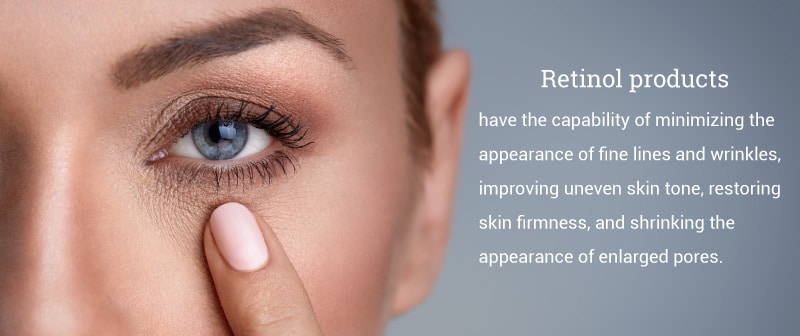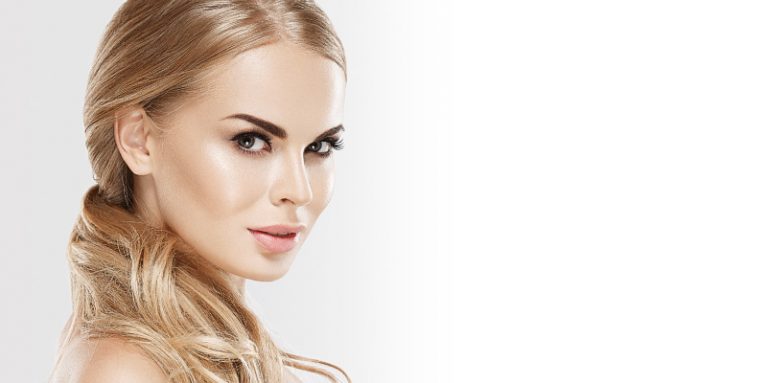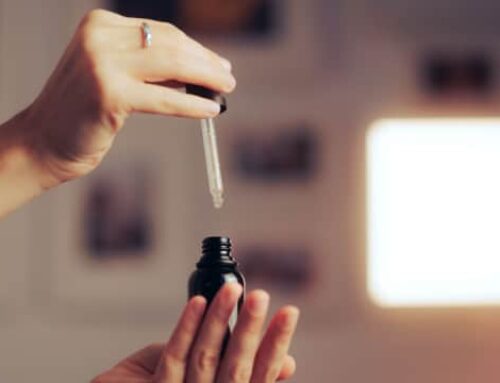The proper use and application of retinol, an ingredient found in many skincare products, can be confusing to many people, even the experts. There are debates over which formulation is best, which strength is best, and even what time of application is best. But one thing is clear: retinol is one of the best ingredients for fighting fine lines and wrinkles. Keep reading to learn the anti-aging benefits of retinol as well as how to best use retinol products.
What is retinol?
Retinol is another name for vitamin A, which is found in certain foods and can also be synthetically made as a dietary supplement or for use in topical formulations such as facial creams and serums. The various names for the metabolites and synthetic formulations of retinol can cause confusion for many people because they all sound very similar. For example,
retinol can be broken down into retinoic acid, retinyl palmitate, retinaldehyde, retinyl retinoate, and retinyl propionate, all of which can be found in various skincare products. Additionally, Retin-A is the prescription brand name of the all-trans isomer of retinoic acid (tretinoin). The term retinoid encompasses all of the aforementioned derivatives of retinol and is considered a class of chemical compounds that demonstrate vitamin A activity. When discussing over-the-counter anti-aging products, however, skincare experts consider pure retinol to be more effective than any of these retinol derivatives.
What are the benefits of retinol?
Retinol products have the capability of minimizing the appearance of fine lines and wrinkles, improving uneven skin tone, restoring skin firmness, and shrinking the appearance of enlarged pores. See why retinol is considered to be one of the best anti-aging ingredients? To confirm this, let’s look at the science behind how retinol works.
Retinol is able to provide all of these benefits based on a very complex mechanism of action. According to the American Osteopathic College of Dermatology, all retinoids, not just retinol, are very effective at slowing and preventing photo-aging due to UV exposure. This mechanism is explained through its interaction with the retinoic acid (RAR) and retinoid X receptors (RXR) located in the nucleus of the cell. These nuclear receptors increase the production of procollagen and function to block the release of inflammatory mediators. Also, retinol is able to partially improve any collagen deficiency that exists in the skin when applied topically. A publication in Toxicology and Skin Health found that retinol was able to penetrate to the deeper layer of skin (the dermis), where collagen is formed. Finally, since retinol is vitamin A, an antioxidant, applying a retinol product to your skin works to combat the damaging effects of free radicals.

Potential side effects of retinol
With all of the anti-aging benefits of retinol, you may be asking what’s not to love about this skincare ingredient. Unfortunately, retinol products are notorious for causing skin dryness and irritation. These side effects are largely due to how retinol works: increase in cellular turnover reveals a fresh, smooth layer of new skin, but this can also cause dryness and irritation because of transepidermal water loss. (Acta Dermatologica, 1995).
To reduce the incidence of dryness and irritation, it’s recommend to wait at least 10 minutes after washing your face to allow the skin to dry. When the skin is wet the ingredients are able to penetrate the skin more easily, thereby increasing the efficacy of the products as well as the chance of side effects. Additionally, you must use moisturizers that draw in moisture from the air and add that moisture back into your skin while using a retinol product. For instance, moisture-attracting humectants like hyaluronic acid, or skin-softening ingredients like ceramides, are great for sealing moisture back into your skin from the environment.
When is the best time to apply retinol?
There has been a long standing debate over what time of day is best to apply retinol products. It is most often advised to apply retinol at night because retinoids of all kinds make your skin more sensitive to the sun. Retinoids cause sun sensitivity due to their mechanism of exfoliating the top layer of skin. On the other hand, some argue that retinol products work perfectly fine during the day as long as they are applied underneath sunscreen with SPF 30. If you feel as though you may forget to add that extra (yet essential!) layer of sunscreen on top of your retinol product during the day, it is probably best to stick to using retinol at night.
Follow these best practices to reap all of the benefits of retinol, one of the best ingredients for fighting fine lines and wrinkles.














Leave A Comment